|
|
|
Sort Order |
|
|
|
Items / Page
|
|
|
|
|
|
|
| Srl | Item |
| 1 |
ID:
167667
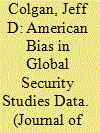

|
|
|
|
|
| Summary/Abstract |
Three major datasets contain problematic interpretative judgments, arguably biased toward the United States: the Polity dataset; Reiter and Stam's data on war outcomes; and Singh and Way's data on nuclear proliferation. These examples raise the possibility that important datasets in global security studies, and in political science more generally, are systematically affected by an American bias. Bias means that, non-Americans might code the same observations differently, on average. The issue arises because Americans, on average, seem to have certain predispositions that non-Americans, on average, do not have. Other nationalities have their own predispositions. I also demonstrate that each of the three empirical examples has significant implications for causal inferences, altering certain statistical findings based upon them. For instance, I reexamine Haber and Menaldo's study of the resource curse, showing that alternative data coding casts substantial doubt on their inferences.
|
|
|
|
|
|
|
|
|
|
|
|
|
|
|
|
| 2 |
ID:
167663
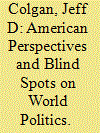

|
|
|
|
|
| Summary/Abstract |
Scholars of international relations (IR) from the United States, like any country, view the world with particular perspectives and beliefs that shape their perceptions, judgments, and worldviews. These perspectives have the potential to affect the answers to a host of important questions—in part by shaping the questions that get asked in the first place. All scholars are potentially affected by national bias, but American bias matters more than others. This special issue focuses on two issues: attention and accuracy in IR research. While previous scholarship has raised principally normative or theoretical concerns about American dominance in IR, our work is heavily empirical and engages directly with the field's mainstream neopositivist approach. The collected articles provide specific, fine-grained examples of how American perspectives matter for IR, using evidence from survey experiments, quantitative datasets, and more. Our evidence suggests that American perspectives, left unexamined, negatively affect our field's research. Still, the essays in this special issue remain bullish about the field's neopositivist project overall. We also offer concrete steps for taking on the problems we identify, and improving our field's scholarship.
|
|
|
|
|
|
|
|
|
|
|
|
|
|
|
|
| 3 |
ID:
178578


|
|
|
|
|
| Summary/Abstract |
Whereas scholars have typically modeled climate change as a global collective action challenge, we offer a dynamic theory of climate politics based on the present and future revaluation of assets. Climate politics can be understood as a contest between owners of assets that accelerate climate change, such as fossil fuel plants, and owners of assets vulnerable to climate change, such as coastal property. To date, obstruction by “climate-forcing” asset holders has been a large barrier to effective climate policy. But as climate change and decarbonization policies proceed, holders of both climate-forcing and “climate-vulnerable” assets stand to lose some or even all of their assets' value over time, and with them, the basis of their political power. This dynamic contest between opposing interests is likely to intensify in many sites of political contestation, from the subnational to transnational levels. As it does so, climate politics will become increasingly existential, potentially reshaping political alignments within and across countries. Such shifts may further undermine the Liberal International Order (LIO); as countries develop pro-climate policies at different speeds and magnitudes, they will have incentives to diverge from existing arrangements over trade and economic integration.
|
|
|
|
|
|
|
|
|
|
|
|
|
|
|
|
| 4 |
ID:
124867
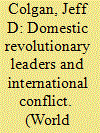

|
|
|
|
|
| Publication |
2013.
|
| Summary/Abstract |
There is a strong scholarly consensus that domestic revolutions create conditions ripe for international conflict. Traditionally scholars have treated revolutions as events, after which there is a period of time during which international conflict is more likely. Yet some states experience significant international conflict only during and in the immediate aftermath of a revolution, whereas other states continue to engage in conflict for many years and even decades afterward. This article seeks to explain the persistence of conflict for some but not all revolutionary states by differentiating the concept of revolutionary leaders from that of revolutions as events, both theoretically and empirically. The author shows that existing theories linking revolution to international conflict underemphasize an important mechanism through which revolution leads to conflict: by selecting conflict-prone leaders through the dynamics of revolutionary politics. He argues that revolutionary politics allow leaders with certain characteristics, including high risk tolerance and strong political ambition to alter the status quo, to obtain executive office because individuals without these characteristics generally do not succeed in leading revolutions. Having obtained power, revolutionary leaders have aggressive preferences that make their states more likely than nonrevolutionary states to instigate international conflict.
|
|
|
|
|
|
|
|
|
|
|
|
|
|
|
|
| 5 |
ID:
133275
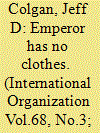

|
|
|
|
|
| Publication |
2014.
|
| Summary/Abstract |
Scholars have long debated the causal impact of international institutions such as the World Trade Organization or the International Monetary Fund. This study investigates Organization of Petroleum Exporting Countries (OPEC), an organization that purports to have significant influence over the market for the world's most important commodity-petroleum. Using four empirical tests, I find that OPEC has little or no impact on its members' production levels. These findings prompt the question of why so many people, including scholars, believe in OPEC's influence over the world's oil supply. The idea of OPEC as a cartel is a "rational myth" that supports the organization's true principal function, which is to generate political benefits for its members. One benefit it generates is international prestige. I test this idea using data on diplomatic representation and find that OPEC membership is associated with increased international recognition by other states. Overall, these findings help one to better understand international regimes and the process of ideational change in world politics.
|
|
|
|
|
|
|
|
|
|
|
|
|
|
|
|
| 6 |
ID:
124380
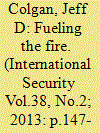

|
|
|
|
|
| Publication |
2013.
|
| Summary/Abstract |
What role does oil play in international security? While the threat of "resource wars" over possession of oil reserves is often exaggerated, the sum total of the political effects generated by the oil industry makes it a leading cause of war. Between one-quarter and one-half of interstate wars since 1973 have been connected to one or more oil-related causal mechanisms. Eight distinct mechanisms exist: resource wars, in which states try to acquire oil reserves by force; petro-aggression, whereby oil facilitates domestic political control of aggressive leaders such as Saddam Hussein or Ayatollah Ruhollah Khomeini; externalization of civil wars in petrostates; financing for insurgencies, such as Iranian oil money to Hezbollah; conflicts over potential oil-market domination, such as the United States' conflict with Iraq over Kuwait in 1991; control over transit routes, such as shipping lanes and pipelines; oil-related grievances, whereby the presence of foreign workers in petrostates helps extremist groups such as al-Qaida recruit locals; and as an obstacle to multilateral cooperation, such as when an importer curries favor with a petrostate to prevent multilateral cooperation on security issues. Understanding these mechanisms can help policymakers design grand strategy and allocate military resources
|
|
|
|
|
|
|
|
|
|
|
|
|
|
|
|
| 7 |
ID:
152583
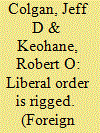

|
|
|
|
|
| Summary/Abstract |
Prior to 2016, debates about the global order mostly revolved around its structure and the question of whether the United States should actively lead it or should retrench, pulling back from its alliances and other commitments. But during the past year or two, it became clear that those debates had missed a key point: today’s crucial foreign policy challenges arise less from problems between countries than from domestic politics within them. That is one lesson of the sudden and surprising return of populism to Western countries, a trend that found its most powerful expression last year in the United Kingdom’s decision to leave the EU, or Brexit, and the election of Donald Trump as U.S. president.
|
|
|
|
|
|
|
|
|
|
|
|
|
|
|
|
| 8 |
ID:
099876


|
|
|
|
|
| Publication |
2010.
|
| Summary/Abstract |
Oil-exporting states, or petrostates, engage in militarized interstate disputes (MIDs) at a much higher rate on average than nonpetrostates. Why is this so? Further, what explains the variation among the petrostates in adopting aggressive foreign policies and engaging in MIDs on that basis? This article develops a theory that proposes that revolutionary petrostates have a higher propensity to launch MIDs than comparable nonpetrostates. This theory is tested with statistical analysis using a new quantitative data set that identifies revolutionary governments in the period 1945-2001. The results show that petro-revolutionary governments constitute a special threat to international peace and security. This evidence of resource-backed aggression challenges the conventional view of petrostates as the targets of international competition for resources.
|
|
|
|
|
|
|
|
|
|
|
|
|
|
|
|
| 9 |
ID:
137023


|
|
|
|
|
| Summary/Abstract |
The resource curse literature suggests two stylized facts about oil-producing states (‘petrostates’) that are not easily reconciled with each other. On one hand, petrostates experience more frequent civil wars than non-petrostates. On the other hand, petrostates have more robust and long-lasting autocratic regimes. This is puzzling because one might expect that one form of instability would lead to the other, as is typical in non-petrostates. If petrostates are more prone to domestic conflict than non-petrostates, and conflicts are opportunities for regime transition and democratization, why do we not observe such transitions more frequently in petrostates? I argue that despite frequent conflicts, rebels rarely succeed in violently overthrowing a petrostate regime or otherwise forcing regime transition. This is because oil generates financial resources that can be used by both an incumbent government and rebels to fund armed conflict, and an incumbent government typically has greater access to these resources. In an analysis of non-democracies for 1946–2004, I also find that oil inhibits democratization in petrostates, but only in the context of violent domestic conflicts. Peaceful pathways to democracy remain open in petrostates. These findings significantly alter our understanding of resource curse. Many scholars argue that oil inhibits democracy because of rentier politics, but this standard interpretation is incomplete. Oil appears to inhibit democratization only in the context of violent domestic conflicts. Ten of the eleven transitions to democracy in petrostates since 1945 occurred without significant domestic conflict.
|
|
|
|
|
|
|
|
|
|
|
|
|
|
|
|
| 10 |
ID:
139792
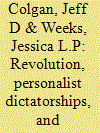

|
|
|
|
|
| Summary/Abstract |
A consensus exists that countries that have recently undergone domestic political revolutions are particularly likely to become involved in military conflicts with other states. However, scholars seek to understand when and why revolutions increase the likelihood of international violence. In contrast to existing work focusing on international systemic factors, we argue that revolution fosters conflict in part by affecting states’ domestic political structures. Previous research has shown that revolution tends to bring particularly aggressive leaders to power. We demonstrate that revolutions also frequently result in personalist dictatorships, or regimes that lack powerful institutions to constrain and punish leaders. By empowering and ensconcing leaders with revisionist preferences and high risk tolerance, revolutions that result in personalist dictatorships are significantly more likely to lead to international conflict than revolutions that culminate in other forms of government. Our arguments and evidence help explain not only why revolution so commonly leads to conflict, but also why some revolutions lead to conflict whereas others do not.
|
|
|
|
|
|
|
|
|
|
|
|
|
|
|
|
| 11 |
ID:
167431


|
|
|
|
|
| Summary/Abstract |
In the 1950s, the United States and Soviet Union abandoned secrecy and began sharing nuclear technology internationally. Soon thereafter, the two superpowers worked together to create the International Atomic Energy Agency (IAEA) to place safeguards on nuclear assistance and eventually added other nonproliferation measures. What explains these decisions? We argue that an international hierarchy framework offers a robust explanation for the superpowers’ behavior. We identify three distinct mechanisms through which rival hierarchies can influence the internal workings of one another: competitive shaming, outbidding, and interhierarchy cooperation. We then probe the plausibility of our argument by investigating multiple observable implications in our case study of nuclear politics. We show that Soviet competitive shaming motivated the United States’ Atoms for Peace program, which sought to strengthen the loyalty of client states or attract new ones. In response, the Soviet Union attempted to outbid the United States with its own technology-sharing program. Ultimately, Moscow and Washington cooperated on the IAEA to limit the risks that nuclear sharing posed to their own dominant positions vis-à-vis subordinate states.
|
|
|
|
|
|
|
|
|
|
|
|
|
|
|
|
| 12 |
ID:
169180
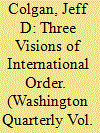

|
|
|
|
|
|
|
|